Spend some time in a garden in winter and you’ll find it’s a very quiet place, resting, waiting. And who doesn’t love a garden in spring? Everything so tidy and organized, seeds planted, rapid growth, early offerings, so full of potential!
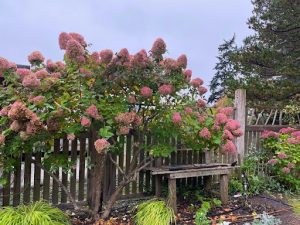
Then summer, when a garden is in its prime – lush, high production; seems that this is what a garden is all about.
But for me, there is something surprising and soulful about a garden in the middle of autumn, when it has been through more than half of its life cycle, yet still flourishing in unique ways in the next to last phase.
I, myself, am in the autumn of my life journey, the phase where the end of life is more fully in my consciousness, and I’ve been exploring how to bloom now, here, in new ways. The reality of my mortality infuses this season of my life with a deep sense of gratitude, humility, commitment, and sacredness.
Sacred Questions
As a participant in one of the Ashram’s first online courses on discovering the sacred, I realized that a sense of sacredness in my life had been, paradoxically, most present for me in the few times that I’d accompanied loved ones as they prepared to die. In those spaces, I was aware of forces not entirely of this world so very present in my experiences of witnessing their sacred passages out of this human realm – and I was left with many questions.
It was my longing to understand death better that led me, at the age of sixty-two, to study conscious dying and death doula practice at the Conscious Dying Institute. Many insights emerged from my studies, perhaps none more impactful than beginning to make peace with my own mortality which brought with it a deep and genuine sense of gratitude for living.
And then something more happened for me. From newfound peace and gratitude, emerged brand new questions around purpose. In what some call the “third third” of our lives, I wondered if there was still more to become. Was there more of my Self to unearth, to release, to seed and grow into? Were there new roles for me to play, different yet based upon all I’d been before, in my family, my community, my work in the world?
In my long career as an educator and coach for social change leadership, most recently as a co-founder of the Wolf Willow Institute for Systems Learning, I’ve spent decades supporting incredible, amazing leaders from all walks of life – almost all at least twenty to thirty years younger than me.
Now, my attention turned towards my peers, those still passionate about wanting to contribute to a better world yet also heeding an inner intuition that called for changes to the focus and quality of their leadership. What would it mean to intentionally seed purposeful, new ways of knowing, being and doing at this point? What would it take to consciously, bravely say ‘yes’ to this inner calling to elderhood?
Soul Work
I wanted to learn more. I stumbled upon a book called “The Inner Work of Age ~ Shifting from Role to Soul” by Connie Zweig. As I read it, I became excited about the author’s explanation that older adults are not yet finished growing up!
The final stages of life can be a profound time of human development, one that we have been preparing for in all our previous steps and stages. A critical phase that, if we are privileged to live long enough, offers us unique opportunities for continued growth. Even more interesting to me, was evidence that this stage of life holds tremendous purpose and potential, not only for individuals but for society.
Carl Jung wrote, “A human being would certainly not grow to be seventy or eighty years old if this longevity had no meaning for the species.”
To my mind, this statement connects natural aging to natural meaning and purpose for the health and well-being of all of us. I was reminded that we humans are but one species, a part of the natural world of this planet, and subject to natural processes that likely hold relevance for resilience and well-being. This resonated deeply with my soul and filled me with longing to step out more fully onto the natural course of an entire human journey. I developed a new sense of determination and commitment to be all that I could be as I enter the elderhood phase of my own blessed life.
“We suffer from ageing illiteracy.” writes renowned gerontologist, Bill Thomas – and as my own interest increased around how to make the most of the last decades of my life, I had to agree. I began to seek out sources of new learning and development about this part of the life path and discovered programs that promoted new, positive perspectives on ageing.
In September 2022, I enrolled in one such workshop at a beautiful leadership retreat centre on one of the islands off the coast of BC, and stepped into a new circle of fellow seekers, all of a certain age. That phrase, ‘a certain age’ is a funny one – meant to be used when you want to mask your true age, most often used to refer to women, for whom growing older is experienced, in this youth-obsessed culture, as particularly cruel.
Yet in this program on ageing, the phrase was flipped for me. Here was a group very ‘certain’, as in, sure of themselves. We affirmed for each other that older age held new promise and we were eager to develop new mindsets that would support living lives right to the end of life, with purpose, passion and pride.
The good company of my fellow participants breathed new life into my explorations and a seed was planted in my mind. I began to dream of designing a program that might offer even more – not only supporting positive attitudes about ageing but also framing our interest in ageing as whispers of the soul, with deep relevance to the state of our world, and the urgent need for all humans to show up now in our fullest, most mature, most heart-centred selves.
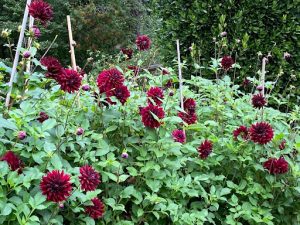
How might we of a certain age truly be part of the necessary transformations in society? My biggest hunch was that if ageing of body, mind and soul is a natural process with genuine purpose, then some of the most profound lessons for we humans might come from Mother Earth.
Whispers from The Garden
On the sunny, October afternoon that the glimmer of an idea emerged connecting ageing and social change, I was sitting on a weathered, wooden bench in the large garden at the leadership centre.
My gaze moved all through the garden, noticing hints of the season that had been and also of the fallow period that was to come. Most of all, I was struck by the unexpected bounty and beauty in ‘the now’ that was all around me!
As if the garden itself was speaking to me, a most provocative question drifted into my mind: What blooms in an autumn garden?
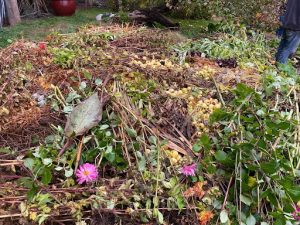
I wandered through and imagined the garden as metaphor for the autumn season of our human lives, looking for clues to answer my questions about the purpose of this time for me and others.
I wondered if the garden somehow knows it’s in the final stages of its life cycle. If so, how does it respond to that conscious knowing? Whether it does or doesn’t, what occurs naturally that is for the good of all the elements present here?
Wandering and wondering, I jotted down the thoughts that flowed through my mind, a stream of new awareness, a rush of fresh questions. All that I was witnessing became a source of deep reflection, prompting powerful questions for me to hold:
- Producing and harvesting seeds appears to be one of the chief purposes – What seeds for the future have I been producing? How am I sharing those? Where might they root?
- Some plants bloom with no purpose except to provide beauty, eliciting in me a sense of awe at the colour, shape, texture, scent – At this stage, how might I define beauty more fully? How can I contribute to beauty in my world? What effect could my beauty or my beautiful offerings have on me and others?
- There are plants that are reblooming – Are there any parts of myself ready to bloom again? What shape and colour will my reblooming take?
- There is thoughtful pruning taking place now for the sake of future growth – Is there anything in my life that is taking up too much space? In what ways? What if I cut it back?
- Some plants, like kale, have more sweetness in the autumn – What aspects of myself have grown or could grow sweeter? What effect does that have on me? On others?
- Many plants have grown hardier with time – Are there aspects of myself that have grown hardier with time? In what ways might this matter?
- If a plant or part of the garden has become overgrown or too large, one of the dangers is that its shade has negative effects on the growth of other plants – Does the shade that I cast get in the way of the growth of others?
- Late in the season, some plants’ key purpose is to offer shelter and nutrition for busy pollinators – How might I offer shelter and sustenance to others with different roles and/or lives than mine?
- The compost pile is growing; in fact, it is immense in the autumn – What is composting within me and in my life that is potentially a resource to the people who are coming after me? How might this matter in the world?
Transformations
These seemed critical questions for moving towards an understanding of social purpose in the eldering stage of life.
A year later, I and two dear colleagues from Wolf Willow Institute returned to that center to pilot a program based on a deep inquiry into eldering and transformation in these tumultuous times. The circle of diverse participants included an Indigenous Knowledge Keeper, an artist, a community organizer, a foundation director, a grandmother, a lifelong activist for social justice, an academic, a counselor, and a leadership educator, among others.
They were all interested in deepening their understanding of what this older stage of their lives might hold as meaningful both personally and professionally. Over the next few days, we explored across cultures and life experiences, our understandings of the keyword, “eldering” – clarifying that term as attached to older age, and dialogue around cultural appropriation of Indigenous traditions, and spiritual roles of Elders. Our focus considered lessons from many different cultures but was mostly taking a deep dive into our personal understandings of eldering and elderhood – learning from and with each other.
Together we wondered about the process of “transformation”, both the individual experience as well as at a societal level. We told stories to shed light on lessons from our life journeys. We identified and welcomed parts of our shadow selves to support our wholeness. We explored our big questions around mortality, life purpose, wisdom and humility through art, Indigenous traditional knowledge, time on the land, and developmental frameworks.
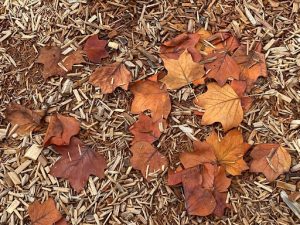
We reviewed complexity leadership capacities and discussed how those might look subtly different in actions we might take at this stage of life. We stilled internal and external noise to be in touch with our souls.
And we created space to admit that this, one of the final stages of adult development, is not easy. Not at all. It calls for us to keep our hearts wide open despite feelings of vulnerability, grief and fear. Richard Rohr, the author of “Falling Upwards, A Spirituality for the Two Halves of Life”, writes, “This is perhaps our major stumbling stone, the price we must pay to keep the human heart from closing down and to keep the soul open for something more.”
I come upon hints of that “something more for the soul” in all kinds of places. It tugs at my heart when I gaze into the eyes of my grandchildren or when I hold the hand of an old friend. When I catch my reflection in the mirror, it can surprise me, yet also helps to ground me.
And lately, each year around October, the invitation for my soul to consider “something more” whispers to me in extraordinary ways in the hush and splendour of an autumn garden.
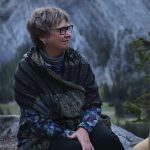
Cheryl Rose is mother and grandmother, as well as a leadership educator, a systems coach, an accredited death doula and end of life educator. She was one of the principal directors for the national Social Innovation Generation (SiG) partnership. She was the Associate Director of the Waterloo Institute for Social Innovation & Resilience (WISIR), a founding director of the Rockefeller Global Fellowship in Social Innovation, a Senior Fellow at McConnell Foundation and a core member of the design and delivery team for the Getting to Maybe Social Innovation Residency at Banff Centre. Most recently, she co-founded and is a director at the Wolf Willow Institute for Systems Learning. Cheryl mentors systems leaders and social innovators across the country and is revered for her kindness, her practical wisdom and her capacity to connect and uplift those at the front lines of change.
